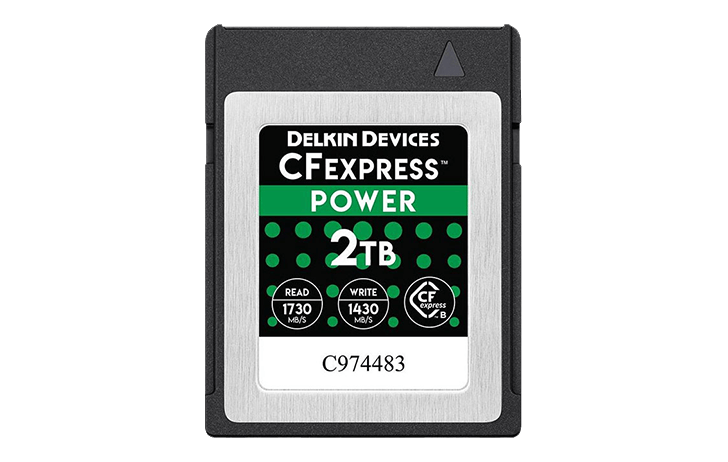POWAY, CA, JUNE 10, 2020 – Delkin Devices, a manufacturer of flash storage solutions and camera accessories, announced today the newest addition to their ever-growing line of memory-based products: CFexpress™ Type-B memory cards. The latest high-speed memory card format, Delkin CFexpress™ cards deliver unrivaled performance at speeds suitable for professional photographers and videographers, while meeting the extensive demands of today's broadcast, cinema and photography industries. Delkin now boasts a complete line of memory card choices for nearly every type of camera/camcorder in the market.
Utilizing a 3rd generation PCI Express interface (as well as supporting NVM Express), Delkin's CFexpress™ memory cards boast recording speeds surpassing 1430MB/s for flawless cinema-quality video capture, including 8K, 6K & 4K at high frame rates and bitrates. They also support RAW continuous-burst shooting without delay, never missing those precious split-second moments! This is especially valuable during special events like weddings, sporting events, concerts, and other situations that can't be redone.
“4K is standard today, 6K is on the rise, and now we're making our way to 8K” says Jenn Sherry, Delkin's Retail Sales & Marketing Manager, “Technology is constantly evolving and as cameras become more advanced, so will the storage solutions associated with them. The possibilities of what CFexpress™ can offer are exciting, and we're looking forward to seeing what our cards will enable both photographers and videographers to capture.
Each CFexpress™ card has undergone extensive testing to ensure full functionality and performance in today's high-end cinematic hosts, including ones from Canon (C500 Mark II & 1D X Mark III), Nikon (Z6 & Z7), and Panasonic (Lumix DC-S1 & S1R). Testing is currently ongoing in the Canon C300 Mark III & R5, as well as the Nikon D6. Data-intensive capture modes, such as Raw video, would require memory cards like CFexpress™ in order to guarantee continuous recording and safe storage. It is important to note though that CFexpress™ cards are not backward compatible with either CompactFlash or CFast 2.0 hosts.
As a bonus, every CFexpress™ card is serialized, like your camera, and backed by Delkin's “48-Hour Replacement Guarantee” policy for the ultimate coverage. Not offered anywhere else in the world, Delkin will replace any non-working CFexpress™ card within 48 hours or less (not including weekends), prior to receiving the non-working card. Cards can also be replaced over-the-counter at any authorized Delkin CFexpress™ reseller.
Delkin CFexpress™ Type-B memory cards have the most extensive capacity coverage, ranging from 64GB to 2TB, and are sold through authorized camera stores worldwide. For more information on Delkin CFexpress™ or other memory products, please visit www.delkindevices.com.


Since I don't do video, a 2TB card would hold my entire Lightroom library and all my photos as well. I have just over 101,000 photo image files plus 17.4GB in my Lightroom folder. The card might be fast enough to treat as a portable hard drive. But the cost makes it impractical.
Could be 3 or 4 - premium 512 cards are already $1/GB, and storage at the max of what's currently available is always more expensive per unit than smaller/easier-to-manufacture cards.
Somewhere, I still have some old SmartMedia cards--though I think they did have 128 MB on them, not KB. I bought a bunch of them dirt cheap as they were going out of fashion, figuring they'd make good floppy replacements. Now nothing I have can read them, and of course thumb drives 256 times or more larger are ubiquitous.
Not sure they even had cards (of any type) before things over 1MB became common.
I remember as a kid drooling over an ad for the Timex Sinclair 1000. 2056 bytes as it came, and you could add a cartridge for another about another 16kb. I saved for the better part of a year for that. Got the memory upgrade the next year for $49. If we were paying that much money per byte with this new card, it would cost $24.5 billion.
Interesting, this has to be oriented to cameras like the R5 with 8K video I am guessing.
I generally download my photos after a shooting session (Walk in the yard, short day trip or the beach etc.) I just would not trust keeping a months worth of photos and more on the card and something get screwed up on my part, the camera or the card and lose it all.
In fact on vacations I carry several cards and sometimes change them out more than once in a day as I visit several sites for the same reason then download at night.
Might seem silly to some but mistakes happen.
Why not Canon?
Yeah but the raw file sizes will be ~225% for photos and ~400% for videos shooting at the maximum resolutions of the R5 :)
Edit: Probably ~112% for video actually; since the 1DX does 5.5k/60p and the R5 will do 8k/30p or 4k/120p. Wonder if it will also get the 5.5k/60p mode, seems like a full 6k/60p would be out of reach as that would be ~126%; keeping with the 112% would net "5.8k".
Take 4k numbers and divide by 4 for an approximation.